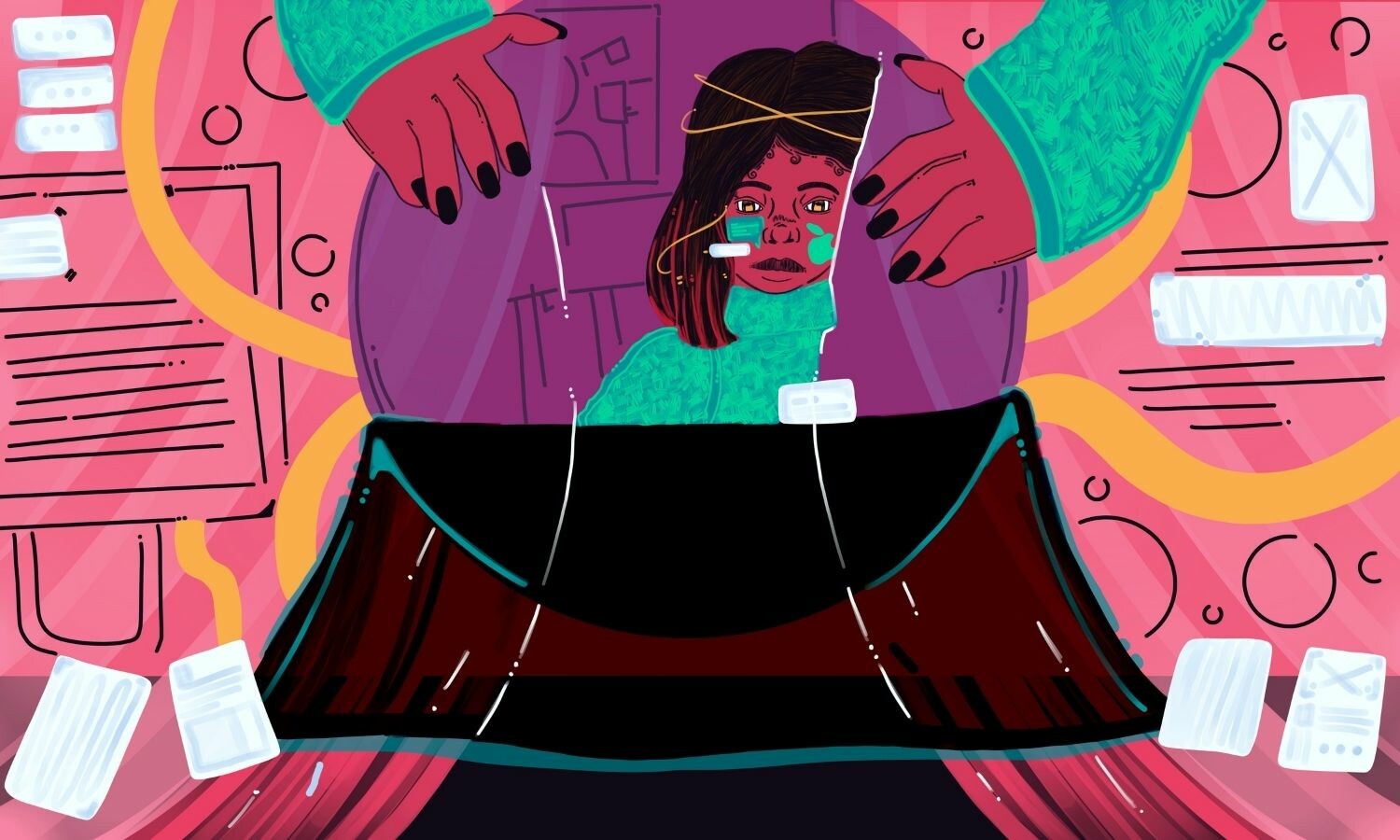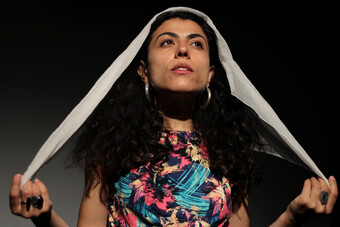Hi there! Welcome to the techno-magical realm where decolonization of cultural and Eurocentric knowledge happens. Today, we’ll take a trip into an alternate future of theatre. I am Kali Cyberwitch and I’ll be your guide.
You might be wondering who I am. I am a theatre fortune-teller and member of Giuvlipen, a Roma theatre collective from Romania. We are a cyber-sorcery-sorority with a minority centrist take. Our paramount goal is the hacking of the racist patriarchal system that is currently seizing power structures in the world of art and theatre.
You shall now be introduced to the concept of a theatre of the future, namely digital supratheatre. This new theatrical practice has two underlying principles: technological change and social change.
Digital supratheatre works based on the principles laid out in the Roma Futurism Manifesto, reclaiming magical thinking and sorcery as tools for fighting the system. Throughout the long history of Roma oppression, since society has continued to leave us completely unarmed in the face of systemic racism, conjuring the magical and the supernatural has been our only weapon.
In our theatre collective, comprised exclusively of Roma actresses, we often feel like witches deploying theatre scripts as spells and incantations. What for? For altering a theatrical milieu dominated by Eurocentrism, ignorance, and, mostly, the refusal of white artists to renounce some of the privileges and power that hold non-white professionals down into precarity.
Along with the reclaiming of sorcery, another one of our cyber-sorority’s main goals is the recouping of technology on behalf of Roma who lack access to modern tech resources. We included this goal in our manifesto and also coined a term for it: techno-sorcery. Techno-sorcery is the marriage between technology and magic, which cyberwitches deploy for the creation of an egalitarian and democratic world. The new reality of a worldwide pandemic has generally pushed communities of non-white artists into ever more vulnerable places, at the same time as, for our Roma theatre collective in particular, has made it impossible to perform in live shows. This is how the two principles of digital supratheatre came to be.
We define digital supratheatre as an artistic practice that goes beyond the traditional forms of theatre as we knew and applied it before the pandemic. Our current vision is of a new artistic potion that works beyond the limitations of “filmed theatre”—aspiring not to becoming film but its own form of art.
Digital supratheatre is not some sort of a theatre-movie hybrid. The incorporation of digital technology as key element in the process of artistic creation poises supratheatre above theatre practice and beyond cinema. We prefer to ascribe supratheatre under the umbrella of “new media art.”
Just like it happened for digital art and electronic music, we expect supratheatre to be contested by conservative cultural figures—the ones who oppose technological as well as social change, turning a blind eye to the fact that throughout history theatre has always found a way to reinvent itself and adapt to new human realities.
Techno-sorcery is the marriage between technology and magic, which cyberwitches deploy for the creation of an egalitarian and democratic world.
In the past, theatre’s reinvention happened alongside technological development. In the future, theatre will incorporate and assimilate technology as one of its defining elements, thus turning into digital supratheatre. In digital supratheatre, technology will not replace but enhance the actor’s gestuality, voice, diction, body language, and craft on the whole, with the end goal of technocatharsis amid the audience.
In digital supratheatre, we’ll create immersive emotional experiences and rely on their magical, transformative power to challenge a collective mindset habituated to artistic products steeped in Eurocentric ideas. We’ll infect the perpetration of European cultural colonialism with our occult malware. We’ll shut down a system of ideas that impose the superiority of Western culture and civilization against Indigenous or minoritarian ones, and ones that also minimize the contribution, expertise, and knowledge of non-Westerners. We are the future of theatre and we’ll make sure that cultural pluralism will put an end to the dark age of Western cultural supremacy. We’ll invoke the internet as a collective spirit to serve our mission of digital justice—i.e. turning the online world into a safe space for those of us who are subjected to the replication of violence we receive in real life on the web.
Furthermore, we oppose and fight the way in which the failure to understand the internet's basic functions has allowed for violence towards people of color to become a product for mass consumption. This monetization of suffering is a consequence of late capitalism. It has led to the commodification of Black death and turned human life into marketable material.
A good case in point is a seminal event from 2020: the killing of George Floyd. The live video of his death took the world by storm. The internet placed the execution of a man of color at our fingertips, made us privy to it. It was an erroneously curated spectacle, an act of mass consumption that dehumanized Afro-Americans and normalized acts of violence targeted against them, making it look as if their lives are of very small value. But when images of violence start touring the internet and television, one of the outcomes is the retraumatization of the audience of color, while also risking to desensitize the public and banalize hate crimes to the point where they become acceptable, something happening so frequently that it becomes ordinary.
On the other hand, what with the popularization of the Black Lives Matter (BLM) movement fueled by Floyd’s case, we couldn’t help but notice the reactions of artists in our theatrical milieu. Eastern Europe is subject to cultural colonialism coming from Western Europe and the United States, so it wasn’t long before politico-cultural debates around BLM took up here too. And a lot of theatremakers in Romania were turned indignant by the BLM’s “attacks” on Western culture and civilization.
For instance, Eurocentrists viewed the act of removing statues of historical racist figures—leaders of the Confederate States, colonialists like Christopher Columbus or King Leopold II of Belgium, the man responsible of the Congo genocide—as vandalism and an ambush on all the cultural hallmarks of white supremacy.
Another case in point, amid the same BLM protests backdrop, was HBO Max’s decision to temporarily remove Gone With the Wind from their catalogue. The company later restored and recontextualized the work, by adding a disclaimer that introduces it in terms of an artistic product loaded with “ethnic and racial prejudices” that “were wrong then and are wrong today.” Similar decisions, from a few other streaming platforms, such as Netflix and Disney+, ensued. The opponents of political correctness took these revisions for artistic censorship and a ban against freedom of expression in art.
We oppose and fight the way in which the failure to understand the internet's basic functions has allowed for violence towards people of color to become a product for mass consumption.
Romanian actors and directors who were expressing concern all over social media over art censorship were in fact crusading for the perpetration of a racist language in both society and art. I documented a bunch of opinions that disseminated through Facebook in response to the “new changes.” Some of them used seemingly candid yet racist jokes as decoy: “Political correctness will now put a ban on brownies, dark chocolate, and gypsy ham”; ”As a sign of protest, from now on I’ll only be wearing black T-shirts”; and: “Is bleaching your clothes racism?”










Comments
The article is just the start of the conversation—we want to know what you think about this subject, too! HowlRound is a space for knowledge-sharing, and we welcome spirited, thoughtful, and on-topic dialogue. Find our full comments policy here